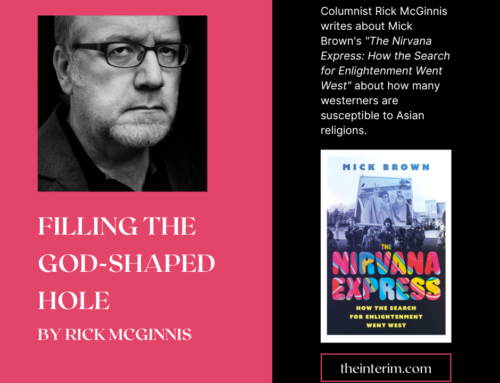 The worst part of being a TV critic, I used to joke to my friends, was having to watch television. Like most jokes, it was mostly a statement of fact. The worst thing about watching TV in the last decade or so was a ubiquity of a lazy trope, played for laughs, that cast men as the village idiot of the family.
The worst part of being a TV critic, I used to joke to my friends, was having to watch television. Like most jokes, it was mostly a statement of fact. The worst thing about watching TV in the last decade or so was a ubiquity of a lazy trope, played for laughs, that cast men as the village idiot of the family.
It reached its apogee with shows like Everybody Loves Raymond and King of Queens, which would doubtless hit the air alongside commercials built around the same witless Dad scenario. Recent examples include the man who loses all his money in Vegas because he didn’t think the chips were real money and the dad who recklessly throws his bulk down a slip-and-slide into a line of garbage cans.
Given the creative trough into which not just Hollywood but most ad agencies have hopelessly tumbled, the “Idiot Dad” meme is just one of dozens of threadbare stereotypes revived endlessly, but it’s also a symptom of an animus against men and boys that’s come to permeate the law and schools, academia and political discourse. It’s a social trend which American psychologist and blogger Helen Smith insists has produced a growing generation of men who are, consciously or unconsciously, opting out of marriage and the social contract, having come to the conclusion – correctly, in Smith’s opinion – that there’s very little in it for them.
Smith’s book, Men on Strike (Encounter Books, $28, 216 pages) joins a growing list of other titles on this phenomenon, which include Christina Hoff Summers The War Against Boys, Hanna Rosin’s The End of Men and the Rise of Women, Kathleen Parker’s Save The Males and Kay Hymowitz’ Manning Up: How The Rise of Women Has Turned Men into Boys. While there are many books by men written on this subject, going back to Warren Farrell’s The Myth of Male Power 20 years ago, numbers suggest that it took female authors to give the subject credibility – to lift it beyond the pitiable spectacle of men whining about their loss of status in a changing world.
Which is deeply ironic, if you think about it for a moment.
Smith begins her book with the story of a group of men she encountered through her blog – men in various stages of middle age, divorced or never married, sharing a house because they’ve collectively given up on the idea of marriage or family, bitter experience having taught them that those games are rigged against them. Citing unreasonable expectations from women, legal bias against men in divorces, and an overall cultural distaste for maleness in general, they’ve banded together in a kind of clubhouse, finding solace in the emotional detente that’s one of the features of male friendship.
Most people would call these men “losers” – immature weaklings unprepared for mature relationships and the burdens of family life, licking their wounds after losing it all in the gauntlet of divorce court. In fact, Smith faults Parker and Hymowitz’ books, despite their surface sympathy for the modern male, with precisely this sort of attitude.
“When reading through these two books,” Smith writes, “I get the impression not that men are autonomous beings who deserve equality as equal citizens in a democratic society, but rather that they should be treated well enough so that they will want to marry women, have children and support them so that women will have a better life.” Smith has “a different take: I propose that men are autonomous beings who are entitled to justice and equality and the pursuit of their own happiness.”
It’s obvious that for a pro-family movement, anything that discourages men and women from creating stable marriages and happy families is a worrying trend, if not an outright threat. But the ongoing cultural phenomenon of the “war on men” is as much a sideshow in the pro-life and pro-family movements as it is in the mainstream, because of implicit attitudes that Smith has highlighted with her book: Men should just “man up” in the face of social hostility, and the men who’ve fallen by the wayside probably weren’t worth it anyway.
I might have been a bit more dismissive of Smith’s book if real life experience hadn’t made it so plausible, for at one point in my life I was surely becoming one of her men on strike.
After the inevitable disappointment of a first, fervent relationship in my 20s – unsanctified and childless; in hindsight to my great relief – I spent much of my 20s and 30s adrift in the sea of serial monogamy, and increasingly discouraged at the hostility, sometimes faint, sometimes overt, I encountered in women my age.
In college I’d witnessed the successes of first and second-wave feminism meld with Marxist ideology and solidify into a social orthodoxy that would become known as political correctness. I didn’t escape it upon leaving school, since my chosen field – journalism – was fully staffed by the college educated, and essentially a philosophical tributary of academia’s increasingly rigid cultural ideals.
Even as a teenager, I saw that the idea that all men were potential rapists, and that maleness was essentially a form of arrested development, had begun to enter polite conversation and popular culture. Think back to the ‘70s, and the explosion of films in every genre – thriller, horror, drama and even comedy – that made men either feral, sinister or witless, an idea that was ultimately enthroned when Thelma & Louise became a critical and box office hit in 1992.
When half of the population is regularly accused of being a threat, a hindrance or an irrelevance, it can’t help but resonate with the other half. It might be negligible to those who’ve married young, but the increasing desperation of the permanently single and the bitterness of the divorced acts as a resonating chamber for this sort of idea, and by my mid-30s, I was resigning myself to the defensive bachelorhood that Smith’s book tries to explain.
I think we can all agree that when women can’t trust men, and men can’t be bothered, we have a problem.
Smith’s book lays out solutions that sound practical, from insisting on respect and male space, to knowing your legal options as a citizen, to men’s rights activism to, ultimately, “going Galt” – that Ayn Randian option of simply opting out, going so far as to abjure military service, law enforcement, or any role that puts you in service to the state. “Why should they fight and possibly die for a culture that sees them both as expendable and like second class citizens?” Smith asks.
As a libertarian, Smith is naturally sympathetic to this sort of zero-sum concept of the social contract; I’m not so sure, since the defense of male roles and prerogatives won’t be made by men who aren’t there to explain or embody them. Up till this point, though, Smith does a great service by showing understanding and even sympathy for all those men who’ve sunk to lowered standards and retreated into hobbies, sexual gamesmanship and even video games, but I doubt that men will reengage with society if they aren’t challenged to rise above its worst expectations.




